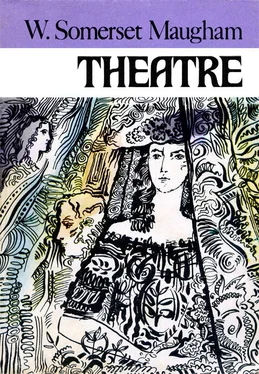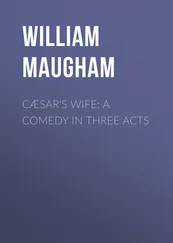William Maugham - Theatre
Здесь есть возможность читать онлайн «William Maugham - Theatre» весь текст электронной книги совершенно бесплатно (целиком полную версию без сокращений). В некоторых случаях можно слушать аудио, скачать через торрент в формате fb2 и присутствует краткое содержание. Жанр: Классическая проза, на английском языке. Описание произведения, (предисловие) а так же отзывы посетителей доступны на портале библиотеки ЛибКат.
- Название:Theatre
- Автор:
- Жанр:
- Год:неизвестен
- ISBN:нет данных
- Рейтинг книги:3 / 5. Голосов: 2
-
Избранное:Добавить в избранное
- Отзывы:
-
Ваша оценка:
- 60
- 1
- 2
- 3
- 4
- 5
Theatre: краткое содержание, описание и аннотация
Предлагаем к чтению аннотацию, описание, краткое содержание или предисловие (зависит от того, что написал сам автор книги «Theatre»). Если вы не нашли необходимую информацию о книге — напишите в комментариях, мы постараемся отыскать её.
is both a tribute to a world from which he had retired and a persuasive testimony to his enthusiasm for drama and the stage.
Theatre — читать онлайн бесплатно полную книгу (весь текст) целиком
Ниже представлен текст книги, разбитый по страницам. Система сохранения места последней прочитанной страницы, позволяет с удобством читать онлайн бесплатно книгу «Theatre», без необходимости каждый раз заново искать на чём Вы остановились. Поставьте закладку, и сможете в любой момент перейти на страницу, на которой закончили чтение.
Интервал:
Закладка:
‘Try not to be too late,’ she said to Julia, ‘It’s going to be a heavenly party.’
‘I’ll come as soon as ever I can.’
At last the crowd was got rid of and Julia, having undressed, began to take off her make-up. Michael came in, wearing a dressing-gown.
‘I say, Julia, you’ll have to go to Dolly’s party by yourself. I’ve got to see the libraries and I can’t manage it. I’m going to sting them.’
‘Oh, all right.’
‘They’re waiting for me now. See you in the morning.’
He went out and she was left alone with Evie. The dress she had arranged to wear for Dolly’s party was placed over a chair. Julia smeared her face with cleansing cream.
‘Evie, Mr Fennel will be ringing up tomorrow. Will you say I’m out?’
Evie looked in the mirror and caught Julia’s eyes. ‘And if he rings up again?’
‘I don’t want to hurt his feelings, poor lamb, but I have a notion I shall be very much engaged for some time now.’
Evie sniffed loudly, and with that rather disgusting habit of hers drew her forefinger across the bottom of her nose.
‘I understand,’ she said dryly.
‘I always said you weren’t such a fool as you looked.’ Julia went on with her face. ‘What’s that dress doing on that chair?’
‘That? That’s the dress you said you’d wear for the party.’
‘Put it away. I can’t go to the party without Mr Gosselyn.’
‘Since when?’
‘Shut up, you old hag. Phone through and say that I’ve got a bad headache and had to go home to bed, but Mr Gosselyn will come if he possibly can.’
‘The party’s being given special for you. You can’t let the poor old gal down like that?’
Julia stamped her feet.
‘I don’t want to go to a party. I won’t go to a party.’
‘There’s nothing for you to eat at home.’
‘I don’t want to go home. I’ll go and have supper at a restaurant.’
‘Who with?’
‘By myself.’
Evie gave her a puzzled glance.
‘The play’s a success, isn’t it?’
‘Yes. Everything’s a success. I feel on the top of the world. I feel like a million dollars. I want to be alone and enjoy myself. Ring up the Berkeley and tell them to keep a table for one in the little room. They’ll know what I mean.’
‘What’s the matter with you?’
‘I shall never in all my life have another moment like this. I’m not going to share it with anyone.’
When Julia had got her face clean she left it. She neither painted her lips nor rouged her cheeks. She put on again the brown coat and skirt in which she had come to the theatre and the same hat. It was a felt hat with a brim, and this she pulled down over one eye so that it should hide as much of her face as possible. When she was ready she looked at herself in the glass.
‘I look like a working dressmaker whose husband’s left her, and who can blame him? I don’t believe a soul would recognize me.’
Evie had had the telephoning done from the stage-door, and when she came back Julia asked her if there were many people waiting for her there.
‘Abouf three ’undred I should say.’
‘Damn.’ She had a sudden desire to see nobody and be seen by nobody. She wanted just for one hour to be obscure. ‘Tell the fireman to let me out at the front and I’ll take a taxi, and then as soon as I’ve got out let the crowd know there’s no use in their waiting.’
‘God only knows what I ’ave to put up with,’ said Evie darkly.
‘You old cow.’
Julia took Evie’s face in her hands and kissed her raddled cheeks; then slipped out of her dressing-room, on to the stage and through the iron door into the darkened auditorium.
Julia’s simple disguise was evidently adequate, for when she came into the little room at the Berkeley of which she was peculiarly fond, the head waiter did not immediately know her.
‘Have you got a corner that you can squeeze me into?’ she asked diffidently.
Her voice and a second glance told him who she was.
‘Your favourite table is waiting for you, Miss Lambert. The message said you would be alone?’ Julia nodded and he led her to a table in the corner of the room, ‘I hear you’ve had a big success tonight, Miss Lambert.’ How quickly good news travelled. ‘What can I order?’
The head waiter was surprised that Julia should be having supper by herself, but the only emotion that it was his business to show clients was gratification at seeing them.
‘I’m very tired, Angelo.’
‘A little caviare to begin with, madame, or some oysters?’
‘Oysters, Angelo, but fat ones.’
‘I will choose them myself, Miss Lambert, and to follow?’
Julia gave a long sigh, for now she could, with a free conscience, order what she had had in mind ever since the end of the second act. She felt she deserved a treat to celebrate her triumph, and for once she meant to throw prudence to the winds.
‘Grilled steak and onions, Angelo, fried potatoes, and a bottle of Bass. Give it me in a silver tankard.’
She probably hadn’t eaten fried potatoes for ten years. But what an occasion it was! By a happy chance on this day she had confirmed her hold on the public by a performance that she could only describe as scintillating, she had settled an old score, by one ingenious device disposing of Avice and making Tom see what a fool he had been, and best of all had proved to herself beyond all question that she was free from the irksome bonds that had oppressed her. Her thought nickered for an instant round Avice.
‘Silly little thing to try to put a spoke in my wheel. I’ll let her have her laughs tomorrow.’
The oysters came and she ate them with enjoyment. She ate two pieces of brown bread and butter with the delicious sense of imperilling her immortal soul, and she took a long drink from the silver tankard.
‘Beer, glorious beer,’she murmured.
She could see Michael’s long face if he knew what she was doing. Poor Michael who imagined she had killed Avice’s scene because she thought he was too attentive to that foolish little blonde. Really, it was pitiful how stupid men were. They said women were vain, they were modest violets in comparison with men. She could not but laugh when she thought of Tom. He had wanted her that afternoon, he had wanted her still more that night. It was wonderful to think that he meant no more to her than a stage-hand. It gave one a grand feeling of confidence to be heart-whole.
The room in which she sat was connected by three archways with the big dining-room where they supped and danced; amid the crowd doubtless were a certain number who had been to the play. How surprised they would be if they knew that the quiet little woman in the corner of the adjoining room, her face half hidden by a felt hat, was Julia Lambert. It gave her a pleasant sense of independence to sit there unknown and unnoticed. They were acting a play for her and she was the audience. She caught brief glimpses of them as they passed the archway, young men and young women, young men and women not so young, men with bald heads and men with fat bellies, old harridans clinging desperately to their painted semblance of youth. Some were in love, and some were jealous, and some were indifferent.
Her steak arrived. It was cooked exactly as she liked it, and the onions were crisp and brown. She ate the fried potatoes delicately, with her fingers, savouring each one as though it were the passing moment that she would bid delay.
‘What is love beside steak and onions?’ she asked. It was enchanting to be alone and allow her mind to wander. She thought once more of Tom and spiritually shrugged a humorous shoulder. ‘It was an amusing experience.’
It would certainly be useful to her one of these days. The sight of the dancers seen through the archway was so much like a scene in a play that she was reminded of a notion that she had first had in St Malo. The agony that she had suffered when Tom deserted her recalled to her memory Racine’s Phèdre which she had studied as a girl with old Jane Taitbout. She read the play again. The torments that afflicted Theseus’ queen were the torments that afflicted her, and she could not but think that there was a striking similarity in their situations. That was a part she could act; she knew what it felt like to be turned down by a young man one had a fancy for. Gosh, what a performance she could give! She knew why in the spring she had acted so badly that Michael had preferred to close down; it was because she was feeling the emotions she portrayed. That was no good. You had to have had the emotions, but you could only play them when you had got over them. She remembered that Charles had once said to her that the origin of poetry was emotion recollected in tranquillity. She didn’t know anything about poetry, but it was certainly true about acting.
Читать дальшеИнтервал:
Закладка:
Похожие книги на «Theatre»
Представляем Вашему вниманию похожие книги на «Theatre» списком для выбора. Мы отобрали схожую по названию и смыслу литературу в надежде предоставить читателям больше вариантов отыскать новые, интересные, ещё непрочитанные произведения.
Обсуждение, отзывы о книге «Theatre» и просто собственные мнения читателей. Оставьте ваши комментарии, напишите, что Вы думаете о произведении, его смысле или главных героях. Укажите что конкретно понравилось, а что нет, и почему Вы так считаете.











